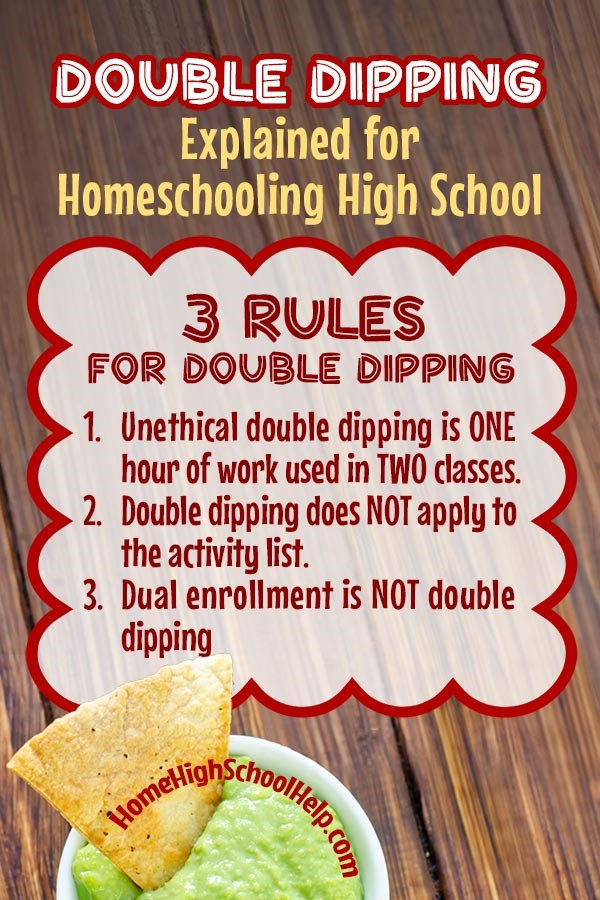Double Dipping Explained for the Homeschool Transcript
"Double dipping" in homeschooling high school is a common problem. It is an offense that you shouldn't commit, but do you know how to avoid it when making your child's homeschool transcript? I can help with my tips below!
Learn how to homeschool high school for excellence. Lee will show you how to get the most out of your homeschool. Download her Homeschool High School for Excellence eBook here.
by Author
Double dipping on a homeschool transcript.
What is double-dipping? Your child's homeschool transcript is more significant than double dipping at a party with friends. We all know that dipping one tortilla chip into guacamole twice is gross. But double dipping on a homeschool transcript is icky and unethical. It happens when you use one hour of work for two classes at the same time. Double dipping on your child's high school transcript is wrong. But, sometimes you can be fooled into thinking something is double dipping when it's actually NOT. Keep reading!
Double dipping is using one hour of work in two separate classes.
Double dipping is counting work twice and applying it to two different high school credits at the same time. Instead, each hour of high school level work can only be counted within one high school class. Double dipping means you are using one hour of work and counting it for multiple classes. Each hour of student work should only count for one high school credit at a time. A full high school credit is 120-180 hours of work, and each hour can only be used once.
Common examples of double dipping.
Every homeschool is unique, but seeing the concept in real life can help explain the difference.
- Example one: a student plays the violin for an orchestra. Double dipping means that the high school transcript included a class called "Violin" and another class called "Orchestra."
- Example two: a student loves dancing but has no other outlet for PE. Double dipping means the high school transcript includes a class called "Dance" and another class called "PE" and both of those classes were based on the student dancing for physical activity.
Double dipping does NOT apply in curricula spanning multiple subjects.
There are some curricula that are very large, take much longer than one hour, and involve multiple subjects. Generally speaking, they will tell you that the curriculum includes multiple subjects. For example, many literature-based curricula will include 1 credit of English, 1 credit of History, and often credit for something else, like theology, Bible, or logic. It's not double dipping because the curriculum has already explained the credits involved in their product, and you know it's true because the curriculum takes multiple hours of work every day. It's not one hour being put in two classes. It's three hours of work being placed in three classes.
Taking two classes in one subject area is NOT double dipping.
Sometimes a student will take two separate classes in the same subject area. While I don't recommend overworking a student in one area, sometimes it will work for a student in specific instances. Using one geography curriculum at the same time as a history curriculum could both be one credit. Be aware that some subjects take longer than others, though. Advanced high school math classes like precalculus and calculus might take longer than an hour a day. Advanced classes in English classes might take longer than an hour a day. English is usually just one credit per year though, including both literature (reading) and composition (writing) rolled into one class worth one credit.
Double dipping does NOT apply to the activity list.
We've already said that double dipping is having one hour in two classes, and giving high school credit twice for the work done. However, it is not double dipping if an hour of work is represented on the transcript and also somewhere else, like an activity list. It's GREAT to have a class that is also an activity. Listing groups and organizations on an activity list shows socialization, passion, and accomplishments. For example, when I was in public high school, every year on my transcript I had a class called Choir. On my activity list said I was a member of the Bellevue High School Concert Choir. One of those is a class. The other is an activity. Another example is Boy Scouts, 4-H, and similar activities. The academic work done during the activities can count for high school credits in PE, fine art, or other subjects. The name of the activity can also be listed on the activity list. Listing something on a homeschool transcript plus an activity list is not double dipping – only counting something twice in a high school credit is double dipping.
Double dipping can break organizational rules.
Read the rules in your teen's organizations to make sure they don't have their own requirements about double dipping. For example, the Congressional Award Program does NOT allow double dipping, and says in their Program Book, " Any activities that you receive class credit for cannot be counted towards the award." But the Boy Scout program encourages double dipping, and ironically activities used in Boy Scouts can also be used for the Congressional Award Program.
Dual enrollment is not double dipping.
Dual enrollment means that a student is taking college courses that will apply to both college and high school at the same time. Each class at college gets put on the high school transcript. The high school (or parent) puts the class on the homeschool transcript. The college provides college credit and a college transcript. These classes aren't counted twice on the high school transcript, only counted on the homeschool transcript once and the college transcript once.
Simply put, there are 3 Rules for Double Dipping:
1. Unethical double dipping is ONE hour of work used in TWO classes.2. Double dipping does NOT apply to the activity list.
3. Dual enrollment is NOT double dipping.
If you find that you need more help with what is and isn't considered double dipping, consider joining the Gold Care Club. There, I can meet with you personally and help you make a homeschool transcript that colleges will love and you'll be proud of.

 Login
Login









.jpg)

Comments